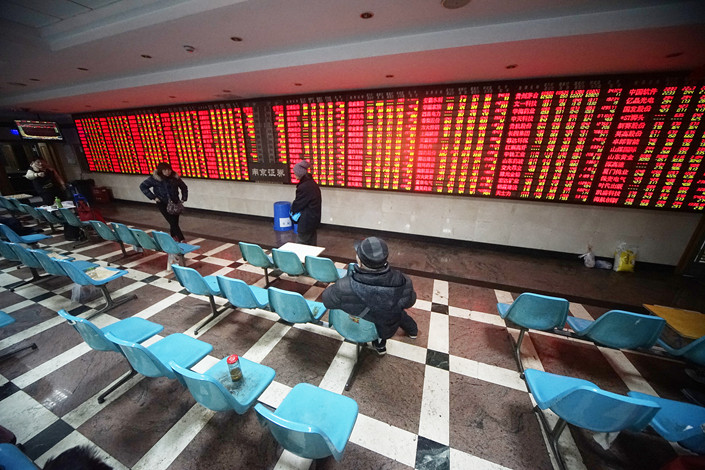

New tech board receives first applications
The first group of candidates to list on China’s new Nasdaq-style high-tech board is expected to be unveiled later this week — and successful applicants could float as early as this year.
On Monday the Shanghai Stock Exchange (SSE) launched a system allowing securities firms to apply to float on its Science and Technology Innovation Board on behalf of those they sponsor. At least 22 companies have said they were looking to do so, according to a list we’ve compiled based on public information.
A website dedicated to the board and linked to the main site of the SSE has also come online. Its design suggests it will provide public information on the status of applications, the specifics of the documents submitted, and the results of their review by an SSE expert committee.
Rules previously released by the bourse say it must make and publish a decision on whether to vet each application within five working days of receiving it. The first batch of decisions — and their applicants — could be revealed on Friday.
FINANCE & ECONOMICS
 |
| Bank of Beijing signed off as guarantor for the principal and interest in a 2.5 billion yuan debt investment plan to finance the renovations of some old buildings in the capital. Photo: VCG |
Debt /
Bank of Beijing stuck making $5.81 million payment on debt it guaranteed
Bank of Beijing has had to pay some 39 million yuan ($5.81 million) in interest on behalf of Citic Guoan Group Co. Ltd., as it serves as guarantor of 2.5 billion yuan of the company’s debts.
The lender said in a stock exchange filing that it signed off as guarantor for the principal and interest from a 2.5 billion yuan Citic Guoan debt investment plan due in 2021. However, because the company failed to make a quarterly interest payment in March, Bank of Beijing had to pay on its behalf. The bank is potentially on the hook for all unpaid principal and interest.
Tax cuts /
New income tax law takes bite from government coffers
China’s income tax revenue shrank by 18.1% YOY in the first two months of the year, according to data released Monday by the Ministry of Finance. China’s new personal income tax law took effect last October, cutting the burden on low-income earners by expanding lower tax brackets and raising the monthly tax-free threshold from 3,500 yuan ($521) to 5,000 yuan.
The impact was felt immediately, with individual income tax revenue growth coming in at 7% last October, down sharply from 20.8% in September, according to the ministry. Still, the cuts may have been offset somewhat by rises in value-added tax revenue, consumption tax revenue, and business income tax. Even China’s national general public budget revenue grew in the first two months.
Spin-off /
State grid to list financial services business
Power transmission giant State Grid Corp. of China is preparing a backdoor listing for its finance unit, becoming the latest big state-run enterprise to spin off its financial services into a separate, publicly traded company.
News of the plan came Monday in a stock exchange announcement from Shanghai Zhixin Electric Co. Ltd., a money-losing electric transformer maker. Zhixin would become the vehicle for the listing using assets from State Grid’s financial unit, State Grid Yingda International Holdings Group Co. Ltd. Zhixin shares were suspended Monday pending an announcement within the next 10 trading days.
Opinion /
The World Bank’s role in the transformation of China’s state sector
In the past four decades, China has transformed from a Soviet-style planned economy to one in which the market plays an increasingly greater role, according to Zhang Chunlin, a lead private sector development specialist at the World Bank Group.
As the private sector flourished, he says, SOEs have also undergone great changes to adapt to the market economy. In a four-part series, Zhang describes the role the World Bank has played in helping China’s state sector to transform, includingthe corporatization of SOEs, commercialization of state ownership, dividend policy and state capital management. Check out parts one and two.
Quick hits /
Analysts butt heads over outlook for China’s surging stock market
Former Vietnamese official hopes factories aren’t moving to Vietnam just because of the trade war
Editorial: Property tax law needs open-door approach
Opinion: Why value-added tax cuts are essential to helping businesses
BUSINESS & TECH
 |
| Employees of China Southern Power Grid perform line maintenance in Dongguan, Guangdong province, on May 29, 2018. Photo: VCG |
Electricity /
Power grid to spend $25.3 billion to support southern mega-city
The power grid company responsible for China’s southern economic powerhouse of Guangdong province said it will boost investment in the Pearl River Delta to 170 billion yuan ($25.3 billion) until 2022 to help slake the region’s growing thirst for electricity.
The Pearl River Delta is home to some of China’s most dynamic and prosperous cities, including the special administrative regions of Hong Kong and Macau, as well as Guangzhou, Shenzhen and Zhuhai. These cities were among the first to race ahead after China began the process of reform and opening up in the late 1970s.
Enterprise IT /
Shenzhen software company stock nosedives after claims of a bubble
David Webb, one of Hong Kong’s most famous stock pickers, wrote on his website that Shenzhen-based enterprise software company Kingdee may not be as profitable as it seems. Rather, the company “has relied on sector-specific tax breaks, government grants, property investment gains and questionable transactions with related parties” to present profits to investors, he said.
Kingdee’s Hong Kong-listed stock has more than tripled over the last two years, but its share price plunged as much as 14.77% during market time Monday after Webb’s report, and it closed as the worst performer on the Hang Seng Composite Index. The stock continued to take a hit Tuesday, closing nearly 3% lower at HK$8.84 ($1.12) on Tuesday.
Dairy /
Chinese dairy company purchases New Zealand milk supply co-op
Chinese dairy behemoth Yili announced Monday that it will buy New Zealand’s second-largest dairy cooperative, Westland, in cash for no more than NZ$246 million ($168.5 million).
A subsidiary of Inner Mongolia-based Yili agreed to pay NZ$3.41 per share to acquire 100% of Westland, valuing Westland at NZ$588 million. The purchase is pending approval by both China’s and New Zealand’s governments, as well as Westland’s shareholders.
Swine flu /
Swine flu prevention moves to the slaughterhouse
China’s Ministry of Agriculture has set a May 1 deadline for local authorities to “clear up” potential disease-spreading risks associated with slaughtering procedures in a bid to contain a national African swine flu epidemic, it said in an announcement.
Slaughterhouses without pollution discharge permits or proper disease prevention measures will be ordered to take immediate corrective actions or shut down. Those that take rectification steps but fail to meet standards by July 1 will be disqualified as slaughterhouse operators.
[“source=caixinglobal”]